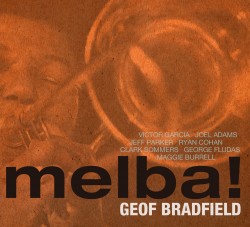MUSIC REVIEW BY George Kanzler, The New York City Jazz Record
Melba Liston, who died 15 years ago this month at 73, was to post-swing and bebop what Mary Lou Williams had been to the Swing Era, a woman who rivaled the most accomplished jazz arrangers and instrumentalists of her time. As a trombonist, she worked with greats of the later 20th Century, including Quincy Jones, Charles Mingus, Dizzy Gillespie and Randy Weston. She wrote big band charts for the latter two and her collaborations with Weston are analogous to the musical partnership of Duke Ellington and Billy Strayhorn. Rather than rehash tunes and arrangements Liston wrote and/or recorded, on Melba! composer/ arranger/saxophonist Geof Bradfield has created an original suite in tribute to and inspired by her musical accomplishments.
The six movements trace Liston's musical and geographical journey, from her childhood in Kansas City to her homecoming there to headline the KansasCity Women's Jazz Festival in 1979 with her all-female septet, ending with Bradfield's setting of the Harlem Renaissance poet Georgia Douglas Johnson's "Let Me Not Lose My Dream", sung by Maggie Burrell. The band is a septet often implying a larger ensemble due to Bradfield's inventive, Liston-inspired sonic palette. The crucial trombone role falls to Joel Adams, whose burnished tone dominates the introductory "Kansas City Child", a mostly rubato, spiritual rumination. He also takes the culminating solo on "Central Avenue", referencing swinging charts Liston did for Williams and Gerald Wilson in her Los Angeles bebop days.
Bradfield creates a richly varied texture of Latin rhythms, changing time signatures, riffs, vamps and solos weaving in and out of the ensemble on "Dizzy Gillespie", Victor Garcia both Harmon-muted and open in the titular role. The long track, like the other 10-minute-plus one, "Homecoming", is an intricate mini-suite in itself. Pianist Ryan Cohan channels the eponymous "Randy Weston", displaying an empathetic sense of form and pace in a piece also notable for bass clarinet (Bradfield), trumpet and guitar voicings and a 6/8 North African feel. A long tenor sax cadenza by the leader introduces "Detroit/Kingston", its deliberate tempo suggestive of reggae and Motown, its centerpiece a reflective but lively guitar solo by Jeff Parker. By invoking the spirit of Melba Liston in a highly personal, creative fashion, Bradfield honors her memory as he carries on her legacy.
The six movements trace Liston's musical and geographical journey, from her childhood in Kansas City to her homecoming there to headline the KansasCity Women's Jazz Festival in 1979 with her all-female septet, ending with Bradfield's setting of the Harlem Renaissance poet Georgia Douglas Johnson's "Let Me Not Lose My Dream", sung by Maggie Burrell. The band is a septet often implying a larger ensemble due to Bradfield's inventive, Liston-inspired sonic palette. The crucial trombone role falls to Joel Adams, whose burnished tone dominates the introductory "Kansas City Child", a mostly rubato, spiritual rumination. He also takes the culminating solo on "Central Avenue", referencing swinging charts Liston did for Williams and Gerald Wilson in her Los Angeles bebop days.
Bradfield creates a richly varied texture of Latin rhythms, changing time signatures, riffs, vamps and solos weaving in and out of the ensemble on "Dizzy Gillespie", Victor Garcia both Harmon-muted and open in the titular role. The long track, like the other 10-minute-plus one, "Homecoming", is an intricate mini-suite in itself. Pianist Ryan Cohan channels the eponymous "Randy Weston", displaying an empathetic sense of form and pace in a piece also notable for bass clarinet (Bradfield), trumpet and guitar voicings and a 6/8 North African feel. A long tenor sax cadenza by the leader introduces "Detroit/Kingston", its deliberate tempo suggestive of reggae and Motown, its centerpiece a reflective but lively guitar solo by Jeff Parker. By invoking the spirit of Melba Liston in a highly personal, creative fashion, Bradfield honors her memory as he carries on her legacy.
Soundclips
Other Reviews of
"melba!":
Jazz Scan by Ric Bang
DownBeat Magaziene by Kirk Silsbee
JazzTimes by Jeff Tamarkin
Jazz Weekly by George W. Harris
LEO Weekly, Louisville by Martin Z. Kasdan Jr.
LongPlay: RadioJAZZ - Poland by Robert Ratajczak
All About Jazz by Hrayr Attarian
NextBop by Alex Marianyi
All About Jazz by Hryar Attarian
emusic Review by Dave Sumner
Midwest Record by Chris Spector
Chicago Tribune by Howard Reich
Chicago Music by Neil Tesser
DownBeat Magazine by David Whiteis
